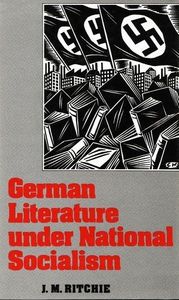Beginning with an exploration of proto-Nazi literature in the late nineteenth century and pursuing later developments up to the arrival of fully fledged National Socialist literature, the author shows the Nazi reaction against big city decadence, Marxism and pacifism. The author examines not only the literature produced inside Germany during the Nazi period, but the exile literature produced outside Germany. The final section of the book discusses the aftermath of the Nazi regime and the problems facing exiles and the reasons for the ultimate lack of resonance of antifascist exile literature in postwar Germany.
The cover is black cloth with gilt lettering to the spine. The book size is 5.5" w x 8.75" h with Notes, Table of Dates, Bibliography, Name Index, Subject Index and 325 pages on good quality paper. ISBN 0389204188. "After 1945 there was an obvious desire within Germany to forget the whole interlude of National Socialism. There was also a widely-held assumption that no literature of any value could have been produced in this period. Only comparatively few historians have been prepared to take the beliefs of the time seriously and to allow that in such literature there was some kind of idealism at work, and that many writers and intellectuals did believe in what they were doing, reacting against the 'decadence' of Weimar culture. This study starts with an exploration of proto-Nazi literature in the early years of this century and pursues later developments up to the arrival of fully fledged National Socialism. Not only literature within Germany is covered; after 1933, republican writers forced into exile, for racial as well as political reasons rejected the anti-semitic 'barbarism' of National Socialism and developed a powerful brand of anti-fascist literature in countries around the world. This 'exile' literature is covered in depth, both for its outstanding individual figures like Brecht and Mann, as well as for the general phenomenon of exile. Attention is particularly focused on those non-Nazis who remained in Germany as 'inner emigres' forming a resistance literature. One forgotten area of resistance also highlighted here is the Spanish Civil War in which many writers fought. Exile raised many problems, not least the nature of the Germany to which exiles might one day return, and a discussion of the divided Germany of the post-1945 period concludes this stimulating and thought-provoking study. J.M. Ritchie is Professor and Head of the Department of Germanic Studies at the University of Sheffield. CONTENTS: Part One: 1914-1933 Germany Sleeps 1. The Weirnar Republics Secret Germany 2. The Making of a People 3. When I Hear 'Culture' I Reach for MY Revolver Part Two: 1933-1945 Inside Germany 4. Germany Awakens 5. Novels and Dramas in the Third Reich 6. Inner Emigration 7. Resistance Part Three: 1933-1945, Outside Germany 8. The Spanish Civil War 9. Exile, the First Phase 10. Exile, the Second Phase 11. Theatre in Exile 12. Lyric and Song in Exile Part Four: 1945 and After 13. The Return from Exile" ( dust jacket ). Bookseller Inventory # 4301RitcLI.
